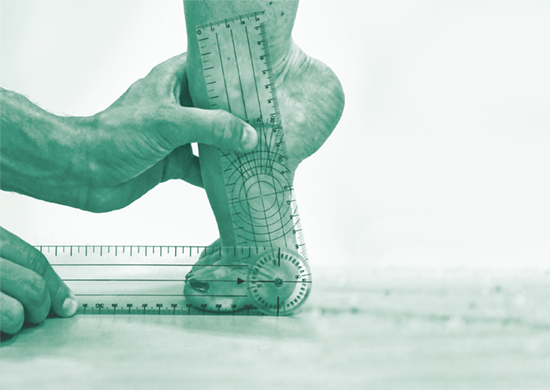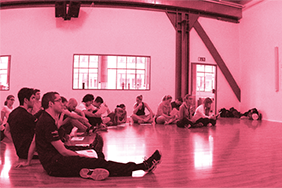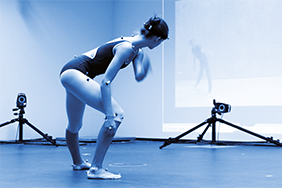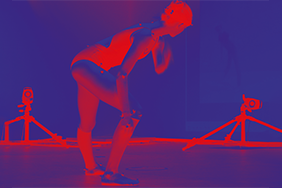CAS in Dance Science: Health & Performance
Institute of Sport Science
In Dance Science, questions about the everyday life of professional dancers as well as the health effects of dance on different population groups (e.g. children, senior citizens) are examined from a sport scientific perspective.
In the CAS Dance Science: Health & Performance, students critically examine the anatomical, neuro-scientific, physiological and psychological foundations of the dancer's body and dancer's health against the background of current findings in dance medicine. However, the focus is not only on the professional area (such as the handling and prevention of dance injuries), but also very centrally on the amateur area. Questions concerning the contribution of dance to the health of children, adolescents, adults and people with disabilities will be dealt with, as well as aspects that are particularly important for these population groups from an anatomical and physiological point of view.
The applied CAS programme qualifies the absolvents to continue their study in the MAS in Dance Science programme of the University of Bern.

| Degree | Certificate of Advanced Studies in Dance Science: Health & Performance DSHP University of Bern (CAS DSHP Unibe) |
|---|---|
| Start | 2027/07/12 |
| Length | 14.07.2025 till 01.03.2026 and 12.07.2027 till 27.02.2028 |
| Scope | 16 ECTS |
| Flexible entry possible | No |
| Single module visitable | No |
| Place | Bern |
| Language | English |
| Admission | For the CAS programme, participants must have a degree from an institution in the tertiary education sector (university, university of applied sciences, higher technical college or vocational training comparable in requirements to a corresponding degree). Exceptions to the admission requirements can be approved by the director of studies "sur dossier". |
| Registration until | 2027/05/31 |
| Cost | CHF 4'500 |
| Special Offer | In exception, payment with maximal 3 instalments is possible. |
| Organising institutions | Institute of Sport Science |
About the programme
The CAS Dance Science: Health & Performance of the University of Bern comprises 16 ECTS points and is part of the Master of Advanced Studies (MAS) in Dance Science. The CAS programme can also be completed separately
The programme comprises 22 course days (147 contact hours) and 16 ECTS-points (ca. 480 working hours in total)
Teaching language is English.
Target audience
The continuing education programme in Dance Science addresses the following target audience from the field of movement, sports, and dance:
- Dance professionals (dancers, teachers, choreographers)
- Artistic directors of schools, dance companies and theatres
- Human Movement Scientists/Sport Scientists
- Physical education teachers
- Physiotherapists, Mensendiek-therapists, Osteopaths, Alexander-, Feldenkrais-, Spiraldynamik-, Pilates- or Gyrotonic instructors
- Experts in the area of medicine, psychology, pedagogy and education, nutrition, biology and biomechanics
Field of application
Graduates of the MAS/CAS in Dance Science are able to apply their knowledge in several ways:
- They are able to improve the training and health of students, professional and amateur dancers through evidenced-based programmes that are both age and population specific.
- They are able to collaborate in scientific research in the field of dance or sport science.
- They are able to teach Dance Science principles in vocational dance programmes (e.g., dance or dance pedagogy).
- They are able to advise directors of dance companies and schools/institutions on well-balanced and healthy training principles, as well as pedagogically responsible training for children, young adults and the elderly.
- They are able to advise the leaders of senior care facilities on the implementation of dance training for the elderly that can improve their quality of life.
- They are able to continue working professional as better-informed dancers, dance teachers or therapists.
Dates
16 ECTS points will be acquired within seven months (July - February). The CAS programme in Dance Science: Health & Performance starts with an intensive week in July/August followed by contact hours on one weekend a month (150 contact hours and 330 hours of self-study). The programme starts every other year in august of odd years 2025, 2027...) and takes place in Bern (Switzerland).
Dates 2025/26
Intensive week: 14 July - 18 July 2025
Weekend 1: 29 - 31 August 2025
Weekend 2: 20 / 21 September 2025
Weekend 3: 4 / 5 October 2025
Weekend 4: 31 October - 2 November 2025
Weekend 5: 29 / 30 November 2025
Weekend 6: 10 / 11 January 2026
Weekend 7: 28 February / 1 March 2026
Modules
Module 1: The Healthy Dancer’s Body
4 x 2 days (4 ECTS points)
Dance is an art form that involves intensive physical activity. The body is the dancers’ instrument. Therefore, the dancers should take care of and nourish it properly. Knowledge of anatomy, physiology, nutrition, training principles and psychology promotes the health and well-being of novice and professional dancers. This module examines common injuries in dance as well as bodily and cognitive adaptations of dance training on several population groups.
Block 1 Anatomy
2 days (1 ECTS point)
- Basic anatomy of the musculoskeletal system
- Adaptation of the human musculoskeletal system to professional dance
- Anatomical characteristics of children, young adults, the elderly and people with disabilities
Block 2 Neuroscience
2 days (1 ECTS point)
- Structure and function of the brain
- Neural basics of consciousness, perception, learning and memory over lifespan
- Dance and cognition
- Neurocognitive processes of the audience when watching dance
Block 3 Orthopaedics and Traumatology
2 days (1 ECTS point)
- Basic overview of specific dance injuries
- Injuries in dance with emphasis on prevention and rehabilitation
- Dance related injuries: the spine, the lower extremity and the foot
- First aid and emergencies in dance
- Management of dance injuries
Block 4 Nutrition
2 days (1 ECTS point)
- Introduction to nutrition
- Specific requirements of nutrient intake in dance
- The influence of nutrition on training
- Discussion of common diets from a scientific perspective
Module 2: The Healthy Dancer’s Performance
4 x 2 days (4 ECTS points)
The key focus of this module is on the relationship between health and performing in novice and professional dancers. How can dance performance be optimised from anatomical, physiological and psychological view-points? How can emotional health be maintained when partaking in this physically and emotionally demanding activity? Aspects of exercise physiology, prevention and rehabilitation for dancers as well as stress management, and reduction in dance class and performance will be discussed.
Block 1 Psychology and communication
2 days (1 ECTS point)
- Basics of emotional intelligence in dance
- Theoretical and practical input on emotional intelligence as a methodological tool
- Emotions in the dance lesson
- Handling of stressors and stress management
- Development of emotionally intelligent solutions that can be transferred into one’s own dance practice
Block 2 Physiology
2 days (1 ECTS point)
- General physiology
- Exercise physiology
- Physiological adaptations across a lifespan
Block 3 Prevention, rehabilitation and occupational medicine
2 days (1 ECTS point)
- Impact of the work environment on the susceptibility and frequency of injuries in dancers
- Prevention and rehabilitation of dance injuries
Block 4 Dance with children, 50+, and less-abled populations
2 days (1 ECTS point)
- Developmental, anatomical and physiological characteristics of a children's, aging or disabled body
- Dance as a prevention of and rehabilitation from comorbidities currently impacting global healthcare
- Practical examples in dealing with special groups
Module 3: Critical Approaches to Dance Medicine and Science
1 day and 1 x 3 days (5 ECTS points)
In this module the principles of scientific writing will be taught. It therefore serves as a practical guide for the content and form of a scientific paper, lecture or of a research project. Aspects of scientific reasoning and writing, literature search, formulation and hypothesis testing are covered. Using practical tasks, participants are taught to develop their own research questions.
Block 1 Basics of the scientific method I
1 day (2 ECTS points)
- Introduction to the searching of scientific literature
- Critical reading of scientific literature
- How to cite properly
Block 2 Basics of scientific method II
3 days (3 ECTS points)
- Argumentation and building of hypotheses
- Structure of a scientific paper
- Development of a research proposal
- Presentation of research results
Assessment
The assessment of the Certificate of Advanced Studies in Dance Science: Health & Performance contains the following elements:
- Presence at block appointments (minimal 90% in total)
- Literature review
- Oral presentation of the literature review
- Research proposal
Based on above elements the programme management decides on the passing of the assessment and the issuing of the Certificate.
Organising institution and faculty
Organising Institution
Institute of Sport Science
Members of the programme management MAS/CAS Dance Science
- Dr. Derrick D. Brown, Victorian College of the Arts, Melbourne, Australia
- Dr. med. Anja Hauschild, Medical School Hamburg, Deutschland
- Prof. Dr. Ernst-Joachim Hossner, Institut für Sportwissenschaft, Universität Bern (Vorsitz)
- Dr. med. Ines Debove, Inselspital, Universität Bern
- Prof. Dr. Fred Mast, Institut für Psychologie, Universität Bern
- PD Dr. Andrea Schärli, Institut für Sportwissenschaft, Universität Bern (Studienleitung)
- Prof. Dr. Mirko Schmidt, Institut für Sportwissenschaft, Universität Bern
Lecturers
- Dr. Imogen Aujla
- Dr. med. Elisabeth Exner-Grave
- Dr. med. Anja Hauschild
- Eva-Maria Kraft
- Julia Monning
- Dr. Andrea Schärli
- Dr. Rolf van de Langenberg
- Edwin Visser
- Anandi van Loon
- Prof. Dr. Daniel Erlacher
- Prof. Dr. Emily Cross
Admission
Candidates must have a degree from a University, ‚Fachhochschule‘, vocational education or equivalent as well as having proof of appropriate experience in the field of dance or another movement related field. This requirement may be waived if the candidate displays exceptional experience in the dance field.
Application and tuition fees
The study fee for the CAS Dance Science: Health & Performance is 4500CHF.
The fee has to be paid before the start of the course with the bill delivered, i.e., until by the latest by the middle of July 2027. In exceptions, payment with maximal 3 instalments is possible.
Application form (PDF, 570KB) for the CAS Dance Science: Health & Performance until 31st of May 2027.
Follow us at Facebook

Follow us at Instagram

Contact

- Name / Titel
- PD Dr. Andrea Schärli
- Funktion
- Lecturer
- andrea.schaerli@unibe.ch
- Phone
- +41 31 684 56 64
- Phone2
- +41 31 684 51 70

- Name / Titel
- Carla Winkelmann
- Funktion
- Secretariat CAS/MAS Dance Science
- dancescience.ispw@unibe.ch
- Phone
- +41 31 684 56 59
- Phone2
- +41 31 684 51 70
Associate Courses
CAS in Dance Science: Psychology & Education
| Degree | CAS |
|---|---|
| Start | 2027/02/26 |
| Language | Englisch |
| Cost | CHF 4'500 |
This CAS focuses on the psychological and pedagogical aspects in dance.
CAS in Dance Science: Motor Learning & Training
| Degree | CAS |
|---|---|
| Start | 2026/03/06 |
| Language | Englisch |
| Cost | CHF 4'500 |
In this CAS candidates will attain proficiency in the dance-related aspects of motor control theory, biomechanics and exercise science.
MAS in Dance Science
| Degree | MAS |
|---|---|
| Start | 2027/07/12 |
| Language | Englisch |
| Cost | CHF 15'000 |
The University of Bern (Switzerland) offers the first Master of Advanced Studies (MAS) programme in Dance Science in Continental Europe. With its unique focus on Dance Science applied to different population groups (e.g., children, older adults, disabilities, as well as amateur and professional dancers), the MAS in Dance Science prepares graduates for a wide range of careers in the dance world.



